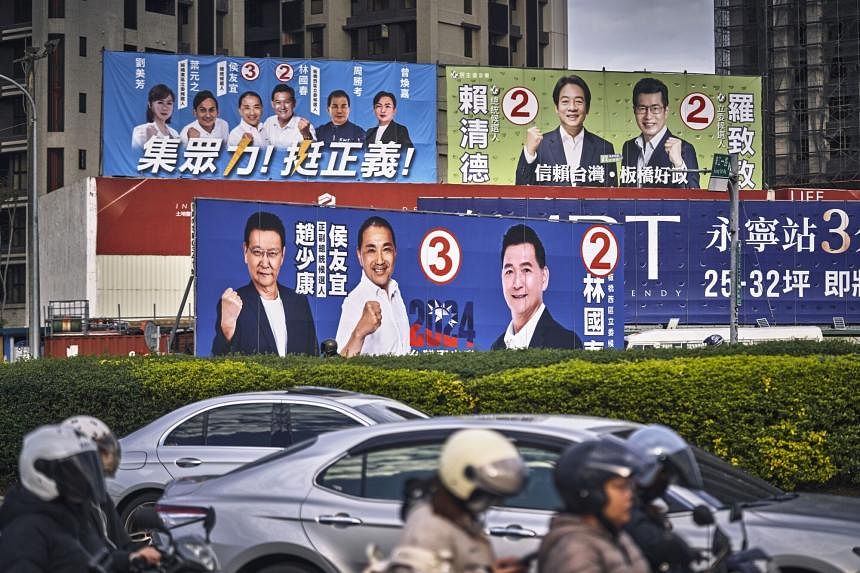BEIJING – Beijing resident Li Chongye, 32, remembers staying up on Aug 2, 2022, to track then United States House Speaker Nancy Pelosi’s flight from Kuala Lumpur to Taiwan, a visit that was shrouded in secrecy until the final moments when she landed on the island.
“There was a very big question of what the Communist Party of China (CPC) would do if that meddlesome woman visited Taiwan,” the computer programmer told The Straits Times. That year, Mrs Pelosi was the highest-ranking official to have visited Taiwan since former US speaker Newt Gingrich’s visit in April 1997. Beijing saw her visit as a sign of provocation to its “one China” principle.
“I kept refreshing the (flight tracker site) Flightradar24 to see the latest updates. I was afraid that her visit would spark a full-blown war between China and the US.”
In contrast, Mr Li said, he has paid little attention to developments in the lead-up to Taiwan’s Jan 13 presidential election, calling them a “regular feature” of Taiwanese politics.
“I don’t think it’s relevant who wins because Taiwan is caught in the US-China rivalry,” he said. “Taiwan is part of China, and we will reclaim it one day, no matter who its leader is.”
Compared with the fever-pitch anticipation of the Pelosi visit, followed by the subsequent diplomatic storm, the ongoing election campaign in Taiwan – which Beijing considers a renegade province to be reunified with it, by force if necessary – appears to have generated far less interest among the Chinese on the mainland.
News of the presidential election on Jan 13 did not make it to microblogging platform Weibo’s list of the hottest topics, which usually indicates netizens’ areas of interest in the latest current affairs.
The netizens who have kept themselves abreast of news of the election – which will primarily pit the CPC-friendly Kuomintang (KMT) against the incumbent Democratic Progressive Party (DPP) – questioned whether a new leader in Taiwan would necessarily lower existing tensions, which have been on a high since Mrs Pelosi’s visit to the island.
They also said that it was more important for Beijing to focus on solving its existing problems, such as improving the economy – the world’s second-largest economy has been on a path of fragile recovery since its zero-Covid policy ended in December 2022.
Taiwan’s latest elections are touted as a watershed event that will influence the island’s future for at least the next four years, given the current US-China rivalry. The DPP is considered friendlier to the US than its rivals.
Opinion polls had shown the DPP’s candidate, Mr Lai Ching-te, in the lead over main rival Mr Hou Yu-ih of the KMT and Dr Ko Wen-je from the Taiwan’s People Party, before a ban on the release of such polls kicked in on Jan 3.
Beijing considers the DPP – and its former leader Tsai Ing-wen, who is currently Taiwan’s President – a separatist force and has refused to engage with the party.
China’s Taiwan Affairs Office (TAO) slammed the DPP as recently as Jan 4.
“Attacking and discrediting the mainland is a common tactic of the DPP during the island’s elections,” TAO spokesman Chen Binhua said during a regular press conference, in response to a question about Mr Lai’s comments that Beijing interferes with the elections in Taiwan.
Ms Sabrina Cao, 27, told ST that Beijing should focus on “more pressing matters, such as the people’s bread and butter”, a sentiment that netizens in China have echoed.
“Frankly, I’m more worried about my career, and whether the economy will pick up this year, rather than whether Taiwan comes back to mainland China or not, or who its next leader is,” said the operations manager who is based in Shanghai.
“Let’s solve our existing problems within mainland China first,” she added.
Associate Professor Alfred Wu, who is with the Lee Kuan Yew School of Public Policy, said China’s zero-Covid policy has sapped public confidence in the country’s future. As a result, the Chinese people are now more focused on their personal problems, while the importance of the Taiwan issue has diminished.
“China has suffered a lot over the past few years (due to the zero-Covid policy),” said Prof Wu, listing problems such as youth unemployment, weak domestic demand and housing woes that the world’s second-largest economy is currently facing.
He noted that there have been “fewer discussions about the latest Taiwan election, compared with the last round in 2020”. One possible reason is concern over censorship, “given that Taiwan is still a sensitive issue”, but it is more likely because China now has more pressing problems to deal with, he added.
In the 2020 presidential election, the DPP’s Ms Tsai won with a record 57.1 per cent of the vote, supported by an electorate that was afraid that Beijing would impose a national security law on Taiwan – the same way it did with Hong Kong – should the Beijing-friendly KMT win.
Under Hong Kong’s national security law, acts that promote secession from the mainland, undermine the authority of the central government and collude with foreign or external forces are criminal. Those convicted may be sentenced to life imprisonment.
Netizens have noted that improving China’s economic situation is another way to get Taiwan to lean towards the mainland.
“We should focus on improving ourselves and the current economic situation so that the Taiwanese will see the benefits of reunification,” wrote Weibo user Puhuo886 from the eastern Jiangsu province.
“If we were to attack by force, we might be subjected to global sanctions, and that would delay our development by decades,” the netizen added, pointing to how major governments in the West punished Russia for its ongoing invasion of Ukraine that started in 2022.


